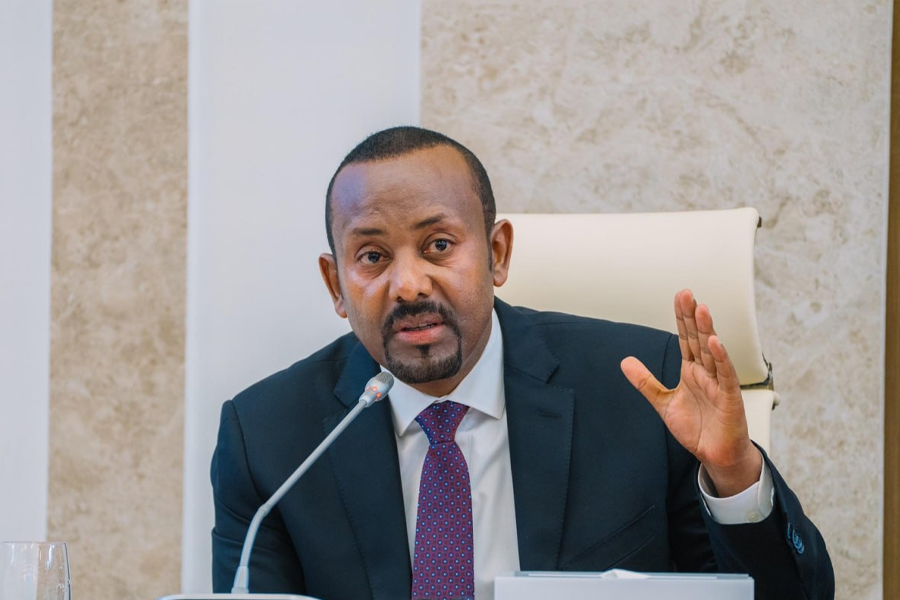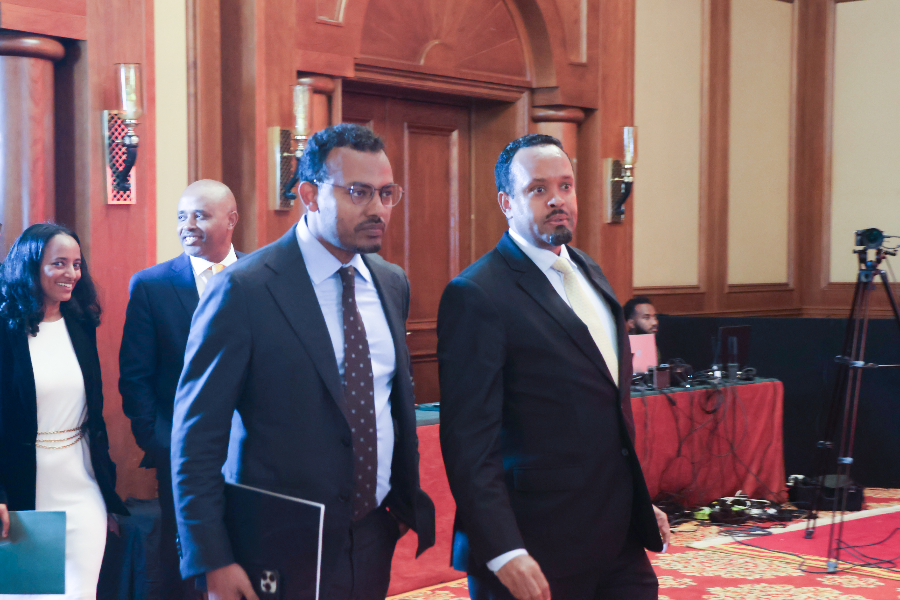
Commentaries | Jun 24,2023
Dec 17 , 2022.
In his recent question-time with members of Parliament, Prime Minister Abiy Ahmed (PhD) painted a rosy picture of the economy that staggered even his ardent supporters.
The Prime Minister claimed Ethiopia’s economic pie grew to 127.6 billion dollars this year, seeing every economic sector registering growth. He also reported GDP per capita surpassing a historical milestone of 1,000 dollars by 212 dollars. He was upbeat in his growth project of 7.5pc for the current fiscal year, making it to the 30-year average of 7.8pc. Contrast this to a projection made by the IMF, four percentage points lower, owing the drop in the forecast to a series of shocks that have dampened growth, pushed inflation high and mounted pressures on the fiscal and external debt fronts.
Cepheus Capital, a private equity firm known for its penetrating and insightful take on Ethiopia’s economy, noted in May this year that spikes in the international market, conflict and drought would be some of the “six distinct shocks” that have besieged the economy.
Understandably, Abiy spun a positive overtone to the economic realities based on reports he received from the national macroeconomic team he chairs. Comprising senior ministers from the central bank and planning commission to the finance ministry, this is a crucial policy lever under the influence of Girma Birru, chief economic advisor to the Prime Minister.
A former trade minister under the late Meles Zenawi, Girma puts another hat as a board chairperson of the central bank, an ideally indispensable federal institution designing and enforcing monetary policies. There, he sits on piles of dysfunctional policy debris to unburden the economy from its regulatory loads.
It may be unfair to put the blames squarely on Girma’s feet for Ethiopia’s balance of payments crisis is long in the making, heavily entrenched and deeply structural. An economy that foot import bills five or six times larger than the revenues it generates from exports is condemned to live with perpetual pain until its policymakers dare to leap of faith in taking fundamental reforms beyond an ad-hoc and piecemeal manner.
Prime Minister Abiy’s Administration was touted by the internationals early on his coming to the office for introducing economic policy measures his aides christened as “homegrown”. Whatever its merits were, it was a reform agenda dead on arrival, buried in the wreckages of a war-footing economy. It appears that a day of reckoning has arrived. The economic malaise can no longer be contained, lest spun in a bright tone.
The extent of the turmoil is manifested in the whole episode of the forex exchange regime, where the parallel market offers people close to a 50 Br premium over the official market, which traded a dollar for 54.2 Br last week.
The weakening of the Birr against a basket of other currencies comes from the inability to pay for imports, despite the administration putting the brake on hundreds of items categorized in 38 classes. Ethiopia spent a monthly average of 1.5 billion dollars on merchandise from other countries; it sold to the world last year mainly commodities valued at a little over 366 million dollars.
The pressure hardly comes from a widening negative trade balance.
Managing public debt generally and meeting Ethiopia’s obligations to international creditors is no kind of menace to the economy. Total public debt stock reached 57.1 billion dollars in September this year, the most recent data available. Domestic debt comprised almost 53pc, and the external debt stock reached 27 billion dollars, 68pc owed by the federal government. Official creditors claim over 80pc of this debt, while the share of private lenders was 18.7%, including the 3.7pc by Eurobond holders.
This is an amount successive administrations borrowed to finance several public infrastructure projects, from mega dams, highways and railways, university campuses, and federal offices. Several of these loans have reached their maturity periods, demanding three times more money in servicing external debt than the case was in the past.
Ethiopia has suffered a loss of considerable revenues over the past two years that would have come in additional loans from official creditors and grants from development partners. And its leaders have only themselves to blame for putting it through what a few of them now admit was an avoidable civil war.
Now macroeconomic policy wonks are back to the drawing table, trying to sort out the vagaries of the foreign exchange market. The issue is no longer “if” but when and under what arrangement they will devalue the Birr, a crucial component of a foreign exchange reform roadmap they have agreed on with the International Monetary Fund (IMF).
Behind this roadmap is a policy objective to lessen the excruciating pain due to forex availability and tame galloping inflation. But whether to introduce a fixed rate regime bridging the wide gap with the parallel market – as tradition dictates – or introduce a multiple exchange rate system is perhaps the debate consuming the long hours of the policy wonks.
In their yearning to try something new, the wonks could likely persuade their political straw bosses to adopt a multiple exchange rate regime. It will not be a policy invention but temporary tool countries occasionally use when economies are under shock, excess pressure on the forex reserve occurs, and businesses panic and flee.
It is an arsenal policymakers deploy to divert forex demands from transactions they consider less critical to imports considered essential by offering fixed rates to the latter. Importers who want to buy items policymakers feel are luxurious can access forex at a rate determined in a free-floating market, which ideally reflects the realities of demand and supply.
If Girma and his wonks choose to travel this path, it would mean that essential imports of fertilizer, oil, fuel, medicine, and industrial inputs could have a fixed rate after Birr is devalued, leaving all other imported goods to scramble in the floated exchange market for the green bucks.
Who and how would the difference between the fixed and the floated rates covered be a puzzle they will have to unriddle. However, such an unusual policy move will have a drawback, as much as it is a measure imposed by realities.
It is a system that encourages indirect subsidies for the sectors identified as priorities or essentials while an undeclared tax on the rest is deemed luxurious. It will betray a cardinal principle in policy-making, which needs to be uniform, non-discriminatory, predictable and fair.
Notwithstanding the merit in following such policy direction, the regulatory capacity and bureaucratic competence to administer such a complex policy tool will prove a nightmare. Those in the bureaucracy may find it convenient to collect rent and create riches from rags. As they always would.
It will not help address the underlying causes of the current predicament, and unlikely for any administration to make a breakthrough in achieving macroeconomic stability without an impactful forex regime reform. Floating the exchange rate is a long time coming. The misconception that devaluing a currency can help the export market become competitive has proven fatal during the reign of Abiy’s predecessors. For an economy with 30 dollars per capita in export earnings against over 100 dollars spent on foreign goods, a step taken in devaluing the Birr will remain all good but delusional.
However, in the absence of meaningful and integrated reforms in the industrial, trade, public and fiscal fronts, aiming at the forex market is as good as focusing on a moving target. Ask India; it has a lot to show how to overhaul a distressed economy.
PUBLISHED ON
Dec 17,2022 [ VOL
23 , NO
1181]

Commentaries | Jun 24,2023

Fortune News | Oct 24,2020

Viewpoints | Jun 28,2025

Fortune News | Oct 27,2024

Verbatim | Nov 02,2024

Viewpoints | Feb 13,2021

Editorial | Apr 26,2025

Radar | May 13,2023

Fortune News | Jul 13,2025

Editorial | Jul 05,2025

My Opinion | 132105 Views | Aug 14,2021

My Opinion | 128507 Views | Aug 21,2021

My Opinion | 126435 Views | Sep 10,2021

My Opinion | 124046 Views | Aug 07,2021

Dec 22 , 2024 . By TIZITA SHEWAFERAW
Charged with transforming colossal state-owned enterprises into modern and competitiv...

Aug 18 , 2024 . By AKSAH ITALO
Although predictable Yonas Zerihun's job in the ride-hailing service is not immune to...

Jul 28 , 2024 . By TIZITA SHEWAFERAW
Unhabitual, perhaps too many, Samuel Gebreyohannes, 38, used to occasionally enjoy a couple of beers at breakfast. However, he recently swit...

Jul 13 , 2024 . By AKSAH ITALO
Investors who rely on tractors, trucks, and field vehicles for commuting, transporting commodities, and f...

Jul 13 , 2025 . By YITBAREK GETACHEW
The Addis Abeba City Revenue Bureau has introduced a new directive set to reshape how...

Jul 13 , 2025 . By BEZAWIT HULUAGER
Addis Abeba has approved a record 350 billion Br budget for the 2025/26 fiscal year,...

Jul 13 , 2025 . By RUTH BERHANU
The Addis Abeba Revenue Bureau has scrapped a value-added tax (VAT) on unprocessed ve...

Jul 13 , 2025 . By NAHOM AYELE
Federal lawmakers have finally brought closure to a protracted and contentious tax de...